Who we are
The Canadian Council for Refugees is a member-based organization. The CCR is led by an Executive Committee, and operates through its main structural elements: the 3 Working Groups. The CCR is also composed of subcommittees and other structures as well as a staff team based in Montreal.
Our Structure
The CCR is made up of member organizations and works collaboratively. Our members play key roles in every aspect of our work.
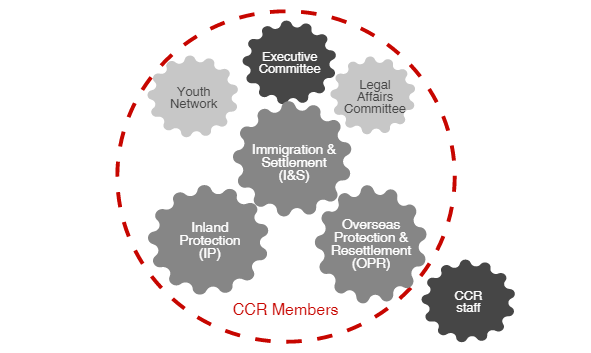
Working Groups
The CCR has three Working Groups (WGs) divided between the three different areas of the CCR’s work. The Working Groups are the forums in which CCR members exchange information, network and develop policy according to their area of concern. They are responsible for preparing resolutions and planning workshops at the national consultations (twice a year), and advising the Executive Committee on policy.
- The Immigration & Settlement Working Group (ccrweb.ca/IS) works on issues relating to refugee and immigrant settlement in Canada, such as:
- Newcomer integration
- Access to services
- Citizenship
- Migrant workers
- Family reunification
- Social justice for newcomers
- The Inland Protection Working Group (ccrweb.ca/IP) works on issues related with the protection of refugee claimants in Canada or seeking to come to Canada, such as:
- Refugee determination system
- Issues for refugee claimants
- Family reunification
- Regularization
- Immigration detention
- Deportation
- Post-claim recourses
- The Overseas Protection and Resettlement Working Group (ccrweb.ca/OPR) works on issues related to refugees overseas and sponsored refugees, such as:
- Refugee resettlement to Canada and internationally
- Needs and challenges for sponsored refugees before and after resettlement (whether resettled through government programs or private sponsorship)
- Needs and challenges for sponsors (private/collective sponsorhip)
- Refugee protection around the world
Subcommittees
Migrant workers subcommittee is a consultative committee created from the Immigration & Settlement Working Group. Based on a non-hierarchical structure, the committee includes local networks, social justice groups and organizations from across Canada whose work is tied to migrant worker issues in Canada and aims at informing the CCR‘s migrant workers’ work.
For more information, contact Marisa Berry Méndez, Settlement Director at marisa@ccrweb.ca
Other Structures
The Anti-Trafficking Committee is a stand-alone committee whose work intersects with immigration and settlement as well as domestic rights protection issues. Members represent local anti-trafficking networks, social justice groups and service providers. The Committee supports anti-trafficking networking across regions, and provides pan-Canadian leadership on the CCR’s anti-trafficking work.
For more information, contact Elvira Truglia, Anti-Trafficking Project Coordinator at etruglia@ccrweb.ca
The CCR has an active Youth Network (YN) led by a core group of youth from across the country. The YN often has new projects, and organizes a Youth Action Gathering every year in a different Canadian city each time. For more information consult/follow:
- website: ccrweb.ca/en/youth/welcome
- Facebook: ccryouth
- Twitter: ccryouthnetwork
- CCRYN listserv: send your request to subscribe to their listserv via ccrlist@ccrweb.ca
For more information, contact Juliana Cortes Lugo, Youth Network Coordinator at jcortes@ccrweb. ca
This committee oversees the court cases in which the CCR is involved. These cases are aligned with the advocacy work the CCR does to further the rights of refugees and immigrants.
For more information, see ccrweb.ca/en/legal-affairs-committee
The Committee oversees the linguistic inclusivity of the CCR. It monitors bilingualism within the CCR and allows Francophone members a space to have a space to bring up challenges they face.
For more information, contact Sandra Gasana, Member Services Coordinator at sgasana@ccrweb.ca
Executive Committee
The CCR is led by an Executive Committee made up of a maximum of thirteen members. They are in place for a two-year term and are elected during the Fall Consultation. Members of the Executive Committee represent the diversity of the CCR member organizations, and are active within the CCR through their own organizations and through their position in the Executive Committee.
For more information, see ccrweb.ca/en/ccr-structure
The CCR Office
The office is the hired staff (between 5-7 people) that help coordinate and implement the actions of the CCR according to the direction decided by the membership. The CCR office is based in Montreal but acts on a national level.
For more information, see our team at ccrweb.ca/en/ccr-staff
What we do
The CCR’s actions and advocacy have enormous impact in Canadian immigration policies because of our established reputation and expertise. The CCR has been behind the changes to the age of dependants, and has been a major actor pushing to repeal Conditional Permanent Residence for sponsored partners. For the CCR to act and advocate for change on specific issues, members first need to adopt a resolution or request an action. The CCR also produces an annual report on each year's accomplishments.
Resolutions
Resolutions are proposed by the WGs and voted on by members during each Consultation’s General Meeting. Resolutions inform the CCR policies and work. The CCR adopts resolutions in order to take positions on specific policy issues.
For all the CCR resolutions, consult ccrweb.ca/en/resolutions
Action Requests
When a resolution already exists on a specific issue, but Working Group members still wish the CCR membership to act upon the issue, an action request can be presented during general meetings and voted on, urging members to act in a specific way on the issue.
For all the CCR Action requests, consult: ccrweb.ca/en/action
Annual Reports
The CCR produces reports on what has been done the previous year. For an overview, consult our latest annual report at ccrweb.ca/en/annual-report-2016-2017
What guides our work
The CCR operates within certain rules and established practices. We add to these as the membership and the organisation evolves and grows. Our Executive Committee adopts all policies and guiding principles.
Policies and Guiding Principles
- Anti-Oppression Policy: ccrweb.ca/en/ccr-anti-oppression-policy
- Anti-Racism Policy: ccrweb.ca/en/anti-racism-policy
- Guiding Statement on Indigenous Peoples: ccrweb.ca/en/ccr-guiding-statement-indigenous-peoples
- Bilingualism: ccrweb.ca/en/res/bilingualism
- Privacy Policy: ccrweb.ca/en/privacy-policy
- Policy Statement on Refugee Participation: ccrweb.ca/en/ccr-refugee-participation
- Policy on photography, filming and audio-recording: ccrweb.ca/en/policy-recording
For details on all policies, see: ccrweb.ca/sites/ccrweb.ca/files/membhandbk.pdf
Bylaws
The CCR bylaws can be found at ccrweb.ca/en/ccr-bylaws
Member participation
Member participation starts with the Working Groups who are behind the logic of the CCR meeting cycle.
Working Group's leadership
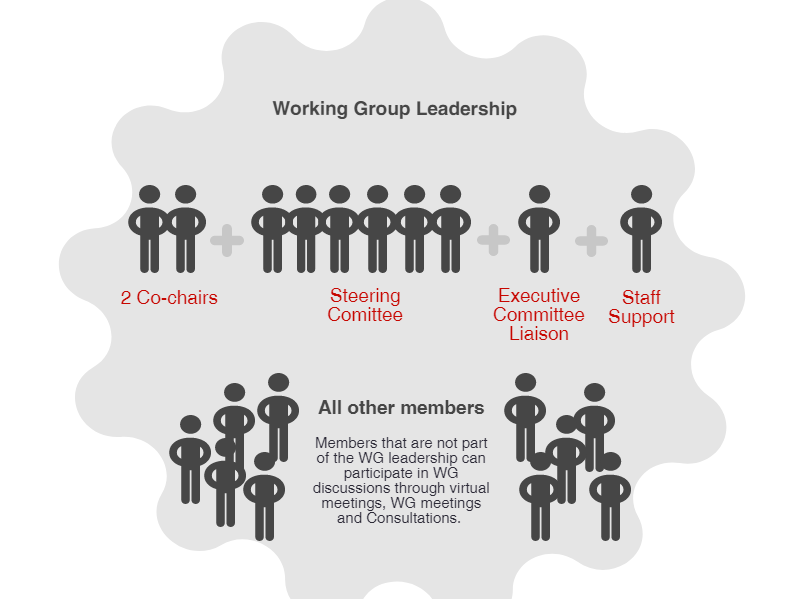
Each Working Group is led by a Steering Committee made up of two co-chairs, a number of representatives, an Executive Committee liaison and a staff support. Joining a Steering Committee is a great way to get more involved in the CCR’s work. They meet by conference call every three months as well as during the four in-person Working Group Meetings.
For more information, consult: ccrweb.ca/en/working-group-steering-committees
Meetings (virtual and in-person)
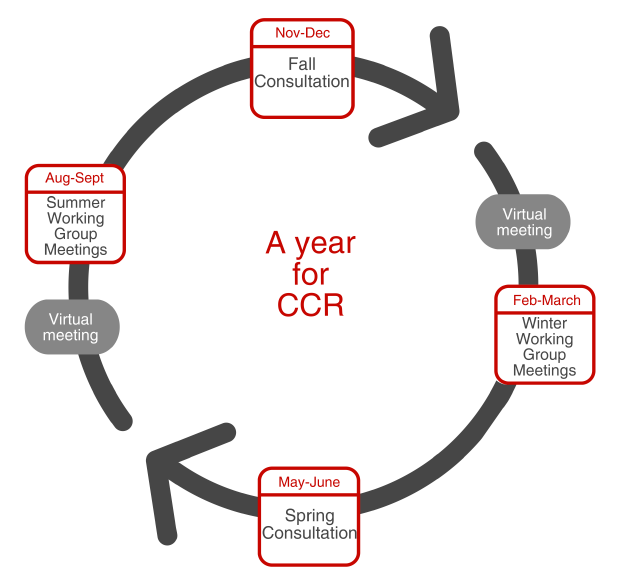
The CCR is increasingly holding virtual meetings, to allow members to connect from across the country on a particular topic of interest (e.g. LGBT issues, detention, etc.). Members are welcome to suggest topics for a virtual meeting.
Virtual meetings are also held before the Working Group Meetings (twice as year) to discuss with members who cannot attend in person and to receive their input. Upcoming virtual meetings are on the member resources page: ccrweb.ca/en/member-resources
They are held twice a year. Once in winter (Toronto) and once in summer (Montreal). They are an opportunity for information exchange and strategizing on emerging issues. Working Group meetings are also where members decide on and plan the workshops for the upcoming Consultation.
These meetings are free of charge and are open to non-members as long as they are not media or representatives of government.
National Consultations are held twice a year, always in a different Canadian city. Once in the fall and once in the spring. During the three days of the Consultation there are:
- Working Group meetings
- Workshops organized by members
- Caucus sessions
- The CCR General meeting
Every Consultation gathers more than 300 participants. They are a great opportunity to network, to gain professional development as you learn and discuss about topics of interest related to refugee and migrant issues, and to share best practices with other participants from across the country. More genral information on Consultations can be found at: ccrweb.ca/en/meetings
All participants need to register for Consultations. See special rates for Members here: ccrweb.ca/en/registration-fees
Forum on Migrant Workers Issues and/or Anti-trafficking forum
Depending in which region the Consultation is taking place and on the capacity of the Migrant worker subcommittee or the Anti-trafficking committee, forums can be held the day before or following a National Consultation. Upcoming forums will always be listed on the CCR meetings page at ccrweb.ca/en/meetings
YAGs take place every year in a different Canadian city in spring or summer. They last 1 or 2 days and are organized by the Youth Network supported by the CCR Office. YAGs are spaces made by and for newcomer youth. All information concerning past and upcoming YAGs is available at ccrweb.ca/en/youth/meetings
Refugee Participation
The CCR is committed to promoting full participation of refugees in all meetings. Such engagement is outlined through our policy on refugee participation available online at: ccrweb.ca/en/ccr-refugee-participation
Concretely, the CCR has been supporting refugee participation within the CCR meeting cycle through registration fee waivers at Consultations for refugees and the Amina Malko Fund for Refugee Participation.
Registration fee waiver at the CCR Consultations
Refugees (whether or not they are members) without an organization to pay their registration fee for the Spring and Fall Consultations can register to attend for free. There is no need to provide any documentation. Note that the waiver is only available to those registering online, by selecting in your form the option “refugee” under Registration fee/Category.
Amina Malko Fund for Refugee Leadership
This fund is named after Amina Malko, a former CCR Executive Committee member, a long time refugee rights activist in Toronto who worked with the Ontario Council of Agencies Serving Immigrants (OCASI) and at one time a refugee herself. She passed away in March 2001 in the prime of her life.
The Canadian Council for Refugees offers funding to assist refugees who aspire to leadership in the CCR to participate in three CCR meetings over the course of a year (two consultations and one set of working group meetings). For more information, see ccrweb.ca/en/amina-malko-leadership-application
Amina Malko Fund for Refugee Participation
The fund was created by the CCR in recognition of financial barriers, which limit refugee participation. Every year, the selected candidates have part of their expenses covered to attend a CCR meeting. Applicants are invited to apply prior to each Consultation to attend the CCR meetings. The invitation to apply is sent to member organizations, and is available at ccrweb.ca/en/amina-malko-application
Access and Profile
User accounts
User accounts give you access to all member benefits as well as the members only sections/publications. It is your identification on the ccrweb.ca as a member of the CCR. Here is a table explaining your access according to your user account type.
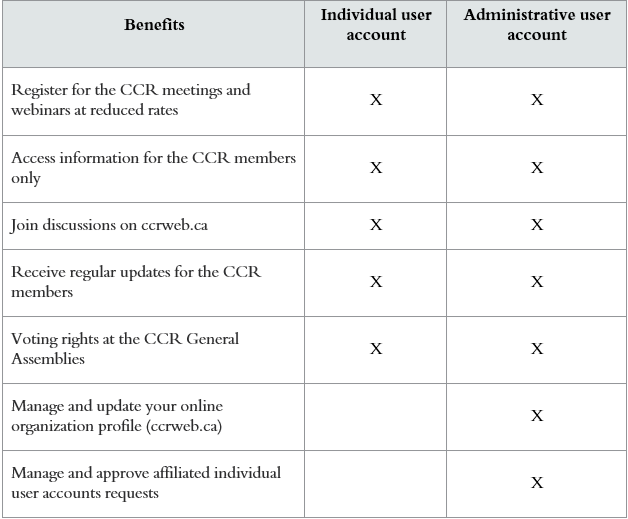
- Administrative user account
All member organizations automatically receive an administrative user account (created by the CCR office once approved as a member).
The member organization thus has to:
- Agree on someone in the organization to be in charge of administrating the account - that person will be the contact person between the CCR and the organization for details relating to the organizational profile and user accounts linked to the organization's profile.
- Give the administrator of the account the access information (username, password and associated email). The username, password and associated email can be changed at any time.
- Have the administrator of the account update the organization's profile and ensure all information is up to date by following these steps:
- Log in at http://ccrweb.ca/user
- On your account page, click on the name of your organization
- Click on EDIT on the top of the page
- Make changes and additions to the information and then press the SAVE button at the bottom to save the changes.
Note: We recommend having a general email address attached to the administrative account such as info@yourorganizationname.org to avoid losing touch with the CCR after staff turnover.
- Individual user accounts
Individual user accounts are the accounts attached to individuals (board members, staff, and volunteers filling a staff role). Each member organization has one Administrative account and a number of individual user accounts. To see what limit of total user accounts applies to an organization, refer to this internal table.
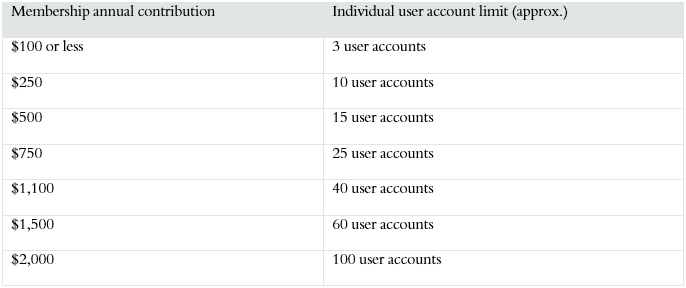
- Create a user account
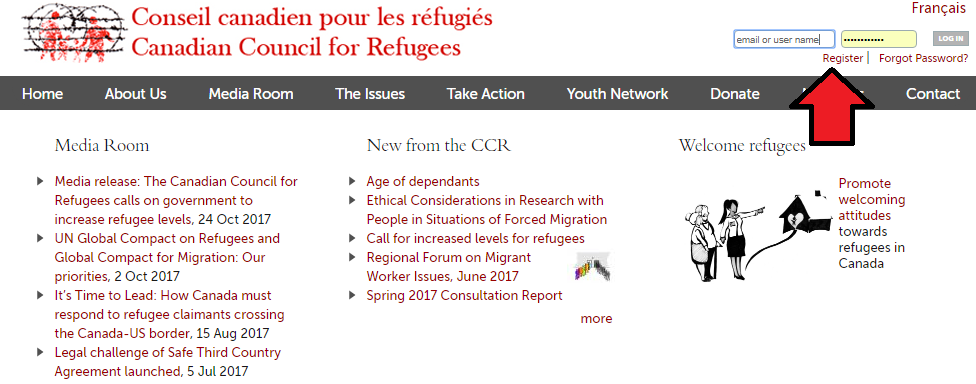
- Click on register (see image)
- Once you get to the “register page” (ccrweb.ca/en/user/register) enter your information:
- A user name. Keep it short.
- An email address. Generally the email address should identify your organization e.g. yourname@yourorganization.or
- Select your organization from the list.
- Your name. *If your email does not identify your organization, explain your role in the organization (staff, board member, etc.)*.
- Go to the bottom and click on CREATE NEW ACCOUNT and you are done!
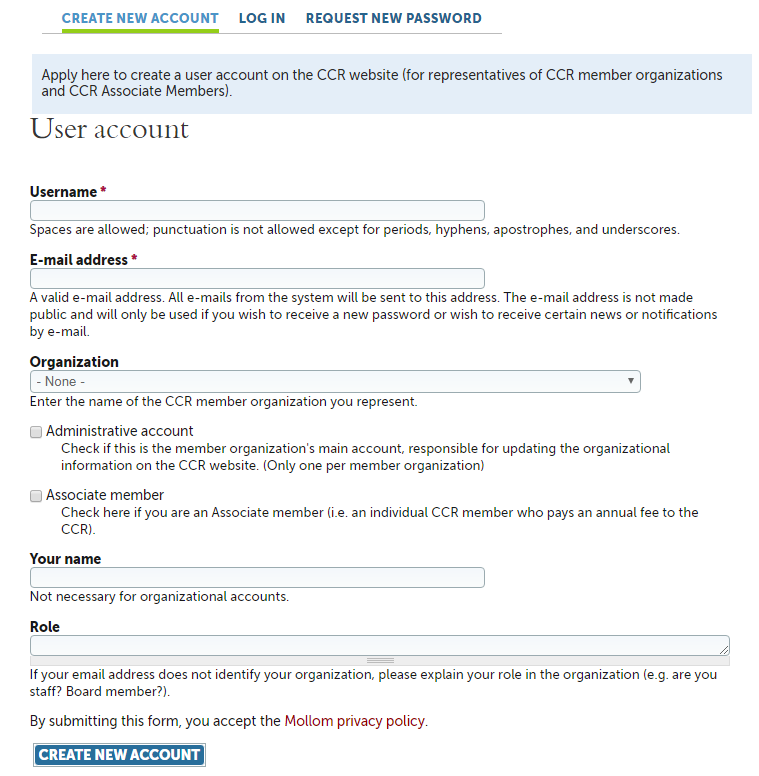
Note: You should not be checking the box for “Administrative Account” nor “Associate Member”, unless your situation indicates otherwise. If this is the case, more information on creating an Administrative account can be found here: ccrweb.ca/en/creating-user-account
If you still have questions concerning the user accounts, consult our frequently asked questions section on user accounts at: ccrweb.ca/en/FAQs-user-accounts.
Profile
- Each organization's profile
Each Member organization has its own profile to manage on ccrweb.ca, and where information is available to other CCR members (name, contact information, type of organization and services provided) and the public (name, and contact information). All member organizations are listed under the "Member directory" page: ccrweb.ca/en/member-directory
Do not forget to update your own organization's information (using the administrative account, go to your organization's page and click on EDIT).
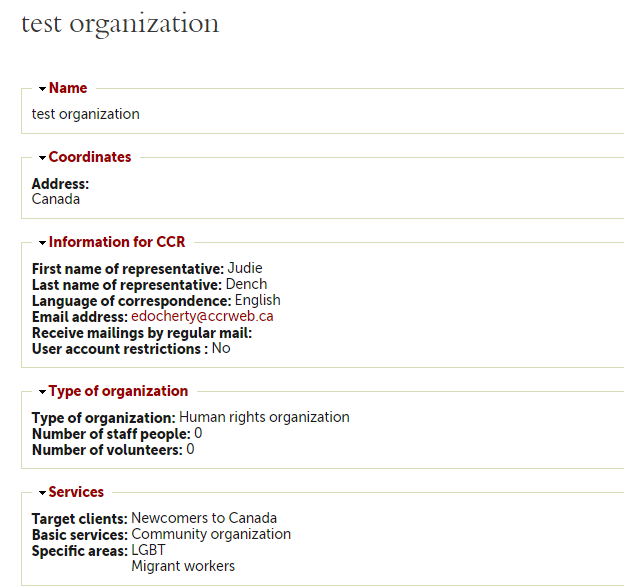
Keeping you informed
Member Resources
The members' home page is the Member Resources page from which you can access all possible resources the CCR publishes for its members. See here for more information, see: ccrweb.ca/en/member-resources
Members' only resources
![]()
Member resources are now identified by this red symbol on the upper right corner of each document or webpage. This means the resource or document cannot be shared with the public because it might contain sensitive information.
Webinars
Webinars are online information or training sessions offered to our members for free. You can register for any upcoming webinar and join them by phone or by computer. Otherwise, you also have access to all past recordings of the CCR webinars, as well as all past Power Point presentations. For more information, see: ccrweb.ca/en/webinars
Practical FAQs
The Practical FAQs section is an online forum exclusive to members. Here, the CCR posts all practical and specific information acoording to different themes (family reunification, citizenship, sponsorship, etc.). The section allows you to comment if you would like to see a question answered or to have more information on an existing topic. See the Practical FAQs here: ccrweb.ca/en/practical-faqs
Case interventions
- Family reunification cases
The CCR has a special arrangement with IRCC which allows us to bring to IRCC Case Management Branch R. 117(9)(d) cases involving children, as well as cases of separated children at risk. The CCR members should contact Janet Dench jdench@ccrweb.ca if they would like a case considered.
See also Strategies for intervening in family reunification cases: Practical guide at: ccrweb.ca/files/frguide.pdf
See also resource from past webinar: ccrweb.ca/en/resources-family-reunification-cases
- Cases involving CBSA
CBSA has provided the CCR with a point person we can contact about cases of refused refugee claimants facing removal before study of an H&C application invoking the best interests of the child or medical conditions. We have also had some success with interventions in other emergencies e.g. people wrongly prevented from making a claim at the US-Canada border, such as Members should contact Janet Dench jdench@ccrweb.ca re cases.
Member Communications
The CCR communicates regularly with its members through user accounts. Whenever a new resource is published, a meeting is announced, a webinar is open for registration or other types of time-sensitive information for members needs to be shared, CCR members receive an email via online accounts. Other member communications such as monthly CCR member mailings and Quarterly Updates of CCR activities are also sent to online accounts.
Member mailings
The CCR sends regular member mailings electronically to the email address of all user accounts. It is an opportunity to notify our members on the CCR updates. Past member mailings are available at ccrweb.ca/en/member-resources
The Quarterly Update
The CCR produces a simple information update that is designed to be shared with staff, Board members and other organizations with whom you work. It is just two pages – or if you prefer, use just the first page. You can find past Quarterly Updates here: ccrweb.ca/en/member-resources
General Communications
The CCR also ensures information-sharing among and speaks out on pressing issues through various public channels, including the CCR listserv, the CCR Chronicle and social media platforms (Facebook and Twitter).
The CCR listserv
The CCR has a listserv called CCRLIST, which offers NGOs an opportunity to receive and exchange information. The CCRLIST is open to everyone except media and government representatives. For more information, see: ccrweb.ca/en/ccrlist
To join, send a note to ccrlist@ccrweb.ca with your name and organization.
The Chronicle
The CCR also publishes a monthly Chronicle, available to all. To receive it electronically, go to: ccrweb.ca/en/subscribe
Social Media
The CCR is active on Facebook and Twitter under ccrweb. Follow us and keep up with the latest news!
What you can do as part of the CCR
Ways to get involved
There are many ways for members to get more involved with the CCR. Here are a few concrete examples, but if you want more information, you can consult ccrweb.ca/en/get-involved
Acting within the CCR Structure
- Create your individual user account on ccrweb.ca and encourage your colleagues to do so
- Attend a meeting/webinar or support your colleagues to do so
- Support youth and refugee participation by promoting opportunities to attend the CCR meetings
- Bring up emerging issues through virtual meetings, webinars, workshops, Working Group meetings that you attend
- Propose a virtual meeting or workshop topic on an emerging issue you think fits within the work of the CCR (e.g. one of the three Working Groups)
- Organize a Consultation workshop
- Take up a call to action from the CCR
- Participate in a Working Group special project (such as organizing a migrant workers’ forum)
- Offer to host a CCR Consultation or a Youth Action Gathering in your city
- Become a Working Group Steering Committee member
- Put your name forward to become an Executive Committee member
Acting to strengthen the CCR's voice and impact
- Host a lunch & learn session to explain what the CCR does to your colleagues and how they can get more involved
- Participate in the Give a toonie challenge to support the CCR financially and to promote the CCR
- Use CCR media talking points to raise issues with local media or community leaders and to profile local examples
- Meet with local MPs to advocate for the CCR priorities using the CCR positions and reports
Promote the CCR membership to organizations you work with on issues affecting refugees and other vulnerable migrants
Become a Friend of the CCR or encourage others to do so
- Host a fundraiser
- Lead a CCR campaign locally (e.g. Lobby Day, Refugee Rights Day)
